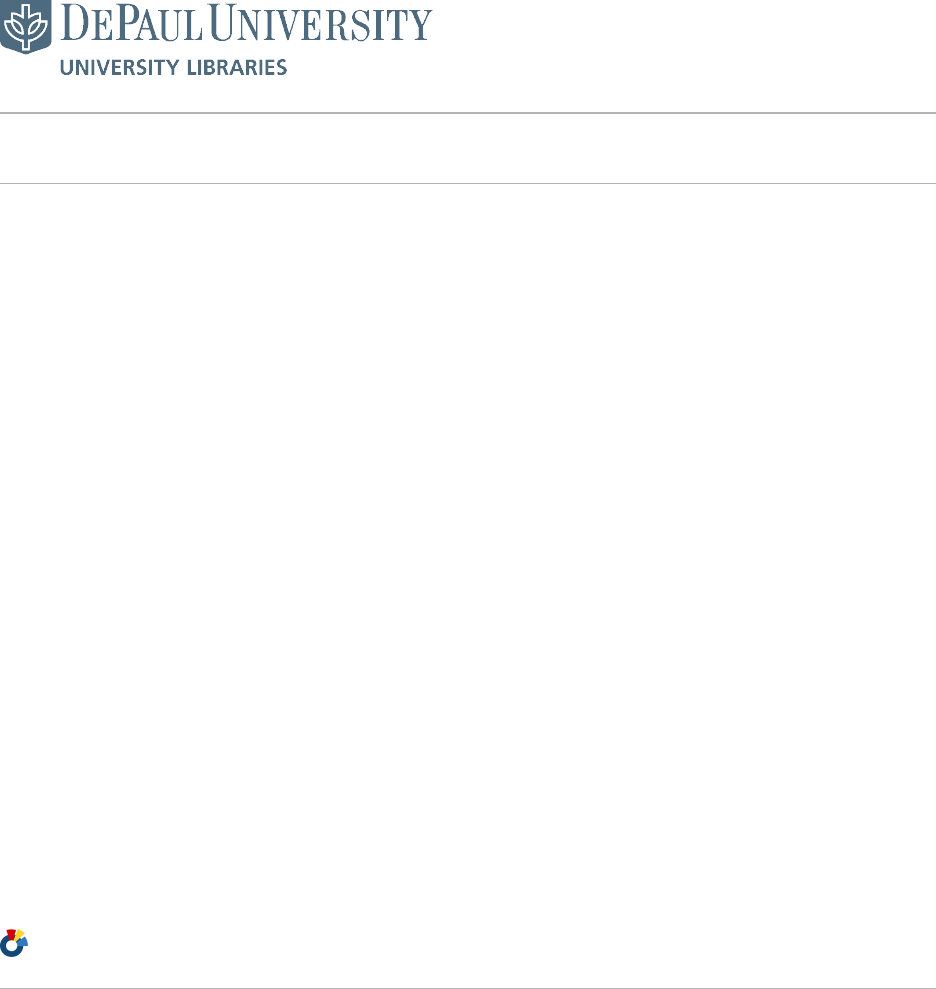
DePaul Journal of Sports Law DePaul Journal of Sports Law
Volume 11
Issue 1
Spring 2015
Article 4
The No-Fantasy League: Why The National Football League The No-Fantasy League: Why The National Football League
Should Ban Its Players From Managing Personal Fantasy Football Should Ban Its Players From Managing Personal Fantasy Football
Teams Teams
Michael B. Engle
Follow this and additional works at: https://via.library.depaul.edu/jslcp
Part of the Entertainment, Arts, and Sports Law Commons
Recommended Citation Recommended Citation
Michael B. Engle,
The No-Fantasy League: Why The National Football League Should Ban Its Players From
Managing Personal Fantasy Football Teams
, 11 DePaul J. Sports L. & Contemp. Probs. (2016)
Available at: https://via.library.depaul.edu/jslcp/vol11/iss1/4
This Article is brought to you for free and open access by the College of Law at Digital Commons@DePaul. It has
been accepted for inclusion in DePaul Journal of Sports Law by an authorized editor of Digital Commons@DePaul.
For more information, please contact [email protected].

\\jciprod01\productn\D\DPS\11-1\DPS103.txt unknown Seq: 1 22-APR-15 10:22
THE NO-FANTASY LEAGUE: WHY THE NATIONAL
FOOTBALL LEAGUE SHOULD BAN ITS PLAYERS
FROM MANAGING PERSONAL FANTASY
FOOTBALL TEAMS
Michael B. Engle*
I
NTRODUCTION
On Thursday, September 25, 2014, the visiting New York Giants of
the National Football League (hereinafter “NFL”) defeated the Wash-
ington Redskins by a score of 45-14.
1
The Week 4 victory was the
second of the season for the Giants, and also represented a “coming-
out party” for the then-obscure Giants tight end Larry Donnell.
2
Donnell was credited with seven catches and seventy-seven receiving
yards, while catching three touchdowns passes from quarterback Eli
Manning.
3
This marked the first time any Giants tight end had scored
three touchdowns in a game since Joe Walton in 1962.
4
Meanwhile, at some interval before Thursday the 25th, Larry Don-
nell was required to finalize his fantasy football roster for the upcom-
ing week.
5
Donnell had himself on his 2014 fantasy roster, and had
started himself the prior week, when the Giants played against the
Houston Texans.
6
In Week 4, however, he elected to bench himself,
instead choosing to start Vernon Davis of the San Francisco 49ers as
* Michael B. Engle is a JD/MBA candidate at the Maurice A. Deane School of Law and the
Frank G. Zarb School of Business at Hofstra University, where he anticipates graduating in
December 2015. Mr. Engle serves as the Technology Editor of the Hofstra Labor & Employment
Law Journal, where his Note on Nepalese slave labor in Qatar for construction on the 2022
FIFA Men’s World Cup will be published in Volume 32. Mr. Engle wishes to thank Professor
Johan S. Powell for his guidance and enthusiastic support on this article, as well as his family for
their unconditional love and understanding throughout the writing process.
1. Boxscore – Giants v Redskins – NFL,
NJ.
COM
, http://stats.nj.com/fb/boxscore.asp?game
code=20140925028&home=28&vis=19&final=true (last visited Nov. 26, 2014).
2. Jordan Raanan, Giants’ Larry Donnell lost fantasy football match because he benched him-
self,
NJ.
COM
(Oct. 1, 2014, 6:21 PM), http://www.nj.com/giants/index.ssf/2014/10/fantasy_football
_giants_te_larry_donnell_lost_because_he_benched_himself.html.
3. Id.
4. Dane Brugler, The unlikely NFL journey of Giants tight end Larry Donnell,
CBS S
PORTS
(Sept. 26, 2014, 5:07 PM), http://www.cbssports.com/nfl/draft/nfl-draft-scout/24725619/the-unlike
ly-nfl-journey-of-giants-tight-end-larry-donnell.
5. Raanan (Oct. 1, 2014), supra note 2.
6. Id.
59

\\jciprod01\productn\D\DPS\11-1\DPS103.txt unknown Seq: 2 22-APR-15 10:22
60 DEPAUL J. SPORTS L. & CONTEMP. PROBS. [Vol. 11:59
his tight end.
7
Davis had a mere two catches for eight yards.
8
In hind-
sight, Donnell would have won the week in his fantasy league if he
had started himself instead of Davis.
9
The following week, Donnell
started himself again and “laid a goose egg” against the Atlanta Fal-
cons (having failed to record a catch).
10
Donnell subsequently de-
cided to bench himself for the rest of the season.
11
Donnell’s decision—namely, never to start himself on his fantasy
team for the rest of the season—appears to be partially superstitious
and partially to make a “win-win” situation, in which he reasoned,
“I’ll bench myself in my fantasy [sic] and then everybody else will
win. . . . I’ll win on Sunday and everybody else will also win on Sun-
day.”
12
Even though Donnell may have minimized the risk of “dis-
tractions” to his locker room by shutting down his personal fantasy
storyline, it is this author’s opinion that Donnell’s experiences opened
a “can of worms” for the NFL. At the very least, this episode shone a
spotlight on a Pandora’s box that has been open for a considerable
amount of time. Donnell claims that he is a newcomer to fantasy foot-
ball, and that he is only playing “for fun and bragging rights.”
13
How-
ever, he quickly became aware of the other—more high-stakes—side
of fantasy football, involving extensive research and big money.
14
Fantasy football has burgeoned from humble beginnings in individ-
uals’ basements in disparate geographic areas into a $40 billion mar-
ket,
15
thanks in part to the Internet’s role in facilitating fantasy
football league management. By its very nature, fantasy football has
the potential to yield esoteric short-term changes in rooting interests
that are subject to change on a week-by-week basis. A fantasy foot-
ball player might be a fan of the Atlanta Falcons, but for one week, he
might need New Orleans Saints quarterback Drew Brees to have a
“big game” with gaudy passing statistics, if (a) said Falcons fan had
7. Id.
8. Id.
9. Id.
10. Charles Curtis, Giants’ Larry Donnell started himself in fantasy football this week (but said
‘LOL’ about zero points),
NJ.
COM
(Oct. 5, 2014, 6:00 PM), http://www.nj.com/giants/index.ssf/
2014/10/giants_larry_donnell_started_himself_in_fantasy_football_this_week_but_said_lol_ab
out_zero_points.html.
11. Jordan Raanan, Giants TE Larry Donnell benches himself in fantasy football for remainder
of the season,
NJ.
COM
(Oct. 9, 2014, 8:34 AM), http://www.nj.com/giants/index.ssf/2014/10/giants_
te_larry_donnell_benches_himself_in_fantasy_football_for_remainder_of_the_season.html.
12. Id.
13. Id.
14. Id. (“People are that in-depth? That serious? . . . Man, I’m just having fun with it.”)
15. Brian Goff, The $70 Billion Fantasy Football Market,
F
ORBES
(Aug. 20, 2013, 10:01 AM),
http://www.forbes.com/sites/briangoff/2013/08/20/the-70-billion-fantasy-football-market/.

\\jciprod01\productn\D\DPS\11-1\DPS103.txt unknown Seq: 3 22-APR-15 10:22
2015] THE NO-FANTASY LEAGUE 61
Drew Brees on his fantasy team, or if (b) the Saints were going against
the Carolina Panthers in a NFL game, while the Falcons fan’s fantasy
opponent of the week has chosen to start the Panthers defense.
To some people who decline participation in fantasy leagues, the
mere thought of having to root for players on other teams out of per-
sonal self-interest is an anathema. On the other hand, proponents of
fantasy football claim that it is minimally different from rooting for an
archrival to beat a team that one’s own team is trying to overcome in
the standings, in order to qualify for the playoffs. While NFL execu-
tives might be eager to champion fantasy football as a way for football
fans to further engage with the NFL (why only follow one team from
afar, when you can have control over your team and an excuse to
watch and follow all thirty-two NFL franchises?), they should be
aware of a devilish connection to gambling. After all, if Larry Don-
nell can operate a fantasy team, so can anybody in the NFL: perhaps a
defensive lineman for the San Diego Chargers might miss a tackle on
Kansas City Chiefs tailback Jamaal Charles, so that he might pick up a
few extra yards before a teammate tackles him instead; or a special
teams player on the Tennessee Titans might not want to block field
goal kicks by Indianapolis Colts kicker Adam Vinatieri; or a retired
player, employed by his former NFL team with a sinecure, might stock
his team with old personal friends and young players from his col-
legiate alma mater, his high school alma mater, or his home region.
There has been considerable debate as to whether fantasy football
is a game of chance or of skill, but regardless, people employed by the
NFL or a member team should be enjoined from operating fantasy
football teams. In Part [A], I will chart the history of fantasy football.
In Part [B] et seq., I will recount instances where active participants in
professional sports leagues were found to have gambled on results in
their direct control, with all the respective negative aftermaths, includ-
ing the Black Sox Scandal, the Pete Rose scandal, point shaving scan-
dals in NCAA basketball, and a results manipulation scandal by NBA
referee Tim Donaghy. In addition to these clear-cut examples of gam-
bling, I will also compare this potential fantasy football fiasco to what
is probably its closest comparable, as a “socially more acceptable”
form of gambling: March Madness pools (pertaining to contestants’
accuracy in predicting outcomes in an elimination bracket involving
more than sixty-three games, culminating in the National Collegiate
Athletic Association (hereinafter “NCAA”) men’s basketball champi-
onship), and one such scandal implicating Rick Neuheisel, who was
then employed by the University of Washington, as the head coach of
its football team.

\\jciprod01\productn\D\DPS\11-1\DPS103.txt unknown Seq: 4 22-APR-15 10:22
62 DEPAUL J. SPORTS L. & CONTEMP. PROBS. [Vol. 11:59
In Part [C], I will highlight arguments on both sides as how to clas-
sify fantasy football, i.e.: in support of fantasy football as a game of
chance, or as a game of skill, and discuss and critique subsequent judi-
cial rulings, congressional lawmaking, and effects on public policy. Fi-
nally, Part [D] will conclude this note with an analysis of relevant
statutory language from the NFL’s collective bargaining agreement.
At this point, I will ascertain whether or not NFL Commissioner
Roger Goodell (a) has the authority under the CBA to immediately
bar employees from having fantasy teams, or (b) must wait until the
expiration of the current CBA to promulgate and enforce such a rule,
and then (c) whether such a ban on fantasy football would be benefi-
cial to the NFL, (d) whether such a ban is likely, and (e) discuss result-
ing residual consequences and possible compromise solutions.
[A]. H
ISTORY OF
F
ANTASY
F
OOTBALL
Fantasy football is, surprisingly, almost as old as modern football.
16
Wilfred “Bill the Gill” Winkenbach, an Oakland, CA-area business-
man and a limited partner in the Oakland Raiders (then of the Ameri-
can Football League, before the advent of the Super Bowl and the
AFL-NFL merger), spearheaded the oldest known fantasy league.
17
In 1962, while in a New York hotel room, in the midst of an east coast,
cross-country Raiders road trip, Winkenbach, Raiders’ public rela-
tions director Bill Tunnel, and Oakland Tribune reporter Scotty Stir-
ling drafted rules that would lay the foundation for modern fantasy
football.
18
These rules were the genesis of the Greater Oakland Pro-
fessional Pigskin Prognosticators League (hereinafter “GOPPPL”).
The GOPPPL’s first draft took place in August 1963, in the rec room
of Winkenbach’s home, among eight charter league members.
19
In or-
der to simplify scoring, which was done manually by consulting the
local sports section of the newspaper, only touchdowns were counted
in scoring.
20
This league is still active and, as per tradition, it is still
“touchdowns only,” despite the extended opportunities available to-
day to award points for other milestones and the ease of computerized
calculations.
21
16. Patrick Hruby, The Founding Fathers of Fantasy,
S
PORTS ON
E
ARTH
(Dec. 2, 2013), http://
www.sportsonearth.com/article/64244480/.
17. Id.
18. Id.
19. Id.
20. Id.
21. Id.

\\jciprod01\productn\D\DPS\11-1\DPS103.txt unknown Seq: 5 22-APR-15 10:22
2015] THE NO-FANTASY LEAGUE 63
Fantasy football was slow to spread, but Andy Mousalimas facili-
tated the first spinoffs in 1969.
22
Mousalimas, who was an original
creator of the GOPPPL and participant in the inaugural draft, brought
fantasy football to King’s X, his sports bar.
23
Mousalimas oversaw ad-
ditional leagues that would meet at the bar; as trivia teams congre-
gated at the bar for the trivia circuit, the concept of fantasy football
became more familiar outside Oakland, even though due to the time-
consuming need to hand-score from newspaper results, it was slow to
gain popularity.
24
However, in 1981, a new—and now long-stand-
ing—league became established in Spokane, WA.
25
As a tribute to its
place of birth, a now-defunct pizza parlor known as Maria’s, the
league is known as “The League Formerly Known as Maria’s.”
26
Like
the GOPPPL, it was “touchdowns only” to facilitate manual scoring;
now, Maria’s League allows for a limited number of “bonus points”
for milestones yardages, e.g.: for every 100 yards a quarterback
throws, for every 100 yards a running back rushes, or for every 50
yards a wide receiver collects in catches, but it remains “mostly touch-
downs” as a tribute to its heritage.
27
In 1985, Jim Boullion and Lee Fanshaw, of Madison, WI, estab-
lished one of the most ambitious fantasy football leagues of its time,
with four distinct categories for scoring.
28
Boullion, Fanshaw, and
eight original owners (of which six still participate) used the Madison
Capitol as the league’s meeting place, as most of the league members
were employees of the Wisconsin State Legislature.
29
The Capital
Football League is one of the earliest, and most long-standing, exam-
ples of a rotisserie league.
30
In rotisserie leagues, instead of keeping
the points earned as a score, players are assigned scores for relative
placement.
31
In other words, there is no difference between finishing
one point ahead of the runner-up or 100 points ahead—the winner
earns a set number of points for winning.
32
22. Id.
23. See Chip Johnson, The sad passing of King’s X,
SFG
ATE
(Sept. 16, 2005, 4:00 AM), http://
www.sfgate.com/bayarea/johnson/article/The-sad-passing-of-King-s-X-2608454.php.
24. Hruby, supra note 16.
25. All About Fantasy Football,
G
UYS
T
ALKING
F
ANTASY
F
OOTBALL
, http://www.guystalking
fantasyfootball.com/GTFF/AAFF.html (last visited Jan. 17, 2015).
26. Id.
27. Id.
28. Fantasy football: Information from Answers.com,
A
NSWERS
.
COM
, http://www.answers.com/
topic/fantasy-football-american (last visited Jan. 26, 2015).
29. Id.
30. Id.
31. Mike Harmon, Fantasy Baseball 101: How to Play ROTO,
F
OX
S
PORTS
(June 6, 2014)
http://www.foxsports.com/fantasy/baseball/story/Harmon-fantasy-baseball-rotisserie-tips-012110.
32.
A
NSWERS
.
COM
, supra note 28.

\\jciprod01\productn\D\DPS\11-1\DPS103.txt unknown Seq: 6 22-APR-15 10:22
64 DEPAUL J. SPORTS L. & CONTEMP. PROBS. [Vol. 11:59
In addition to drafting players and having a head-to-head round
robin schedule among members (awarding six points to a head-to-
head winner, and awarding three points to each player in the case of a
tie), the league awarded points based on team statistics, such as pass-
ing yards, rushing yards, receiving yards, receptions, total yards from
scrimmage, and total scoring.
33
For the team categories, the Capital
Football League awarded points in descending rank order, from
twenty-five for the leader to zero for the last-place finisher.
34
The
Capital Football League also recognized individual categories: for in-
dividual passing yards, passing touchdowns, rushing yards, receiving
yards, receptions, and kicking points.
35
The fantasy team owner who
had the NFL category leader on his team earned five rotisserie points,
the one who had the category runner-up garnered three, and the one
who had the category second runner-up received one.
36
Finally, the
Capital Football League created a “playoff” section at the end of the
regular season, with an extra bonus to the winner of the playoffs.
37
In
this league, the “winner” is the one who has the most points after all
four categories are tabulated.
38
Modern fantasy football was facilitated by improvements in tech-
nology, starting in 1989.
39
Promoters Robert Barbiere and Brad
Wendkos facilitated “Pigskin Playoff,” a de facto-national fantasy
league that was picked up by several major newspapers and allowed
more than 100,000 players to compete against each other, employing
touchtone phone service to make trades and otherwise interact.
40
Fi-
nally, in 1997, CBS launched the beta version of the first free and
publicly available fantasy football website.
41
All other major sports
media websites followed suit within three years, and in 2010, the NFL
itself launched its own site, “NFL.com Fantasy Football.”
42
To this day, fantasy football is the NFL’s most important marketing
tool, with an estimated nineteen million online participants between
33. Id.
34. Id.
35. Id.
36. Id.
37. Id.
38. Id.
39. All About Fantasy Football,
G
UYS
T
ALKING
F
ANTASY
F
OOTBALL
, http://www.guystalking
fantasyfootball.com/GTFF/AAFF.html (last visited Jan. 17, 2015).
40. Id.
41. Id.
42. Id.

\\jciprod01\productn\D\DPS\11-1\DPS103.txt unknown Seq: 7 22-APR-15 10:22
2015] THE NO-FANTASY LEAGUE 65
public and private leagues.
43
As Mr. Goff notes in his Forbes article,
fantasy football could have been incalculably more lucrative for the
NFL, as well as the members of its Players’ Association (hereinafter,
“NFLPA”), i.e.: the players, if they were able to claim the rights to the
statistics.
44
As it stands, the NFL cannot have a trademark claim to,
for example, Marshawn Lynch’s 160-yard game with two touchdowns
for the Seattle Seahawks, because this is considered to be a news
event.
45
On the other hand, the ability to capitalize on fantasy foot-
ball at all was hardly a foregone conclusion until recently. However,
the more appropriate query is to ascertain whether or not the mem-
bers of the NFLPA should be allowed to participate in fantasy
football.
[B]. G
AMBLING ON
S
PORT AND IN
S
PORT
[B-1]. The “Black Sox Scandal:” Eight Major Leaguers, Five
Losses, and One New “Mountain” of a Commissioner
It is widely considered a straightforward tenet in modern sports that
players should not be allowed to place bets on games in their league.
Gambling schemes can impugn the very integrity of the games, as fans
want to know that the athletes are performing at their peaks in order
to win and to earn their results fairly. Indeed, a “scripted” game
where players aim to achieve a predetermined result would be unsatis-
factory, and fans could easily lose interest when conclusions may be
foregone. One of the first, and most famous, instances of match fixing
allegedly involved—but irreversibly implicated—eight members of
the 1919 pennant-winning Chicago White Sox, in the infamous Black
Sox Scandal (later to be immortalized in the book and motion picture,
Eight Men Out).
46
This era of baseball was governed by the longstanding and infamous
(though now severely limited) “reserve clause.”
47
During that era,
owners of Major League Baseball (hereinafter “MLB”) teams owned
43. Jenna Hanington, 5 Things Fantasy Football Can Teach Us about B2B Marketing,
P
ARDOT
(August 26, 2013), http://www.pardot.com/ideas/5-things-fantasy-football-can-teach-us-about-
b2b-marketing/.
44. Goff, supra note 15.
45. Id.; CBS Interactive v. Nat’l Football League Players Ass’n, 259 F.R.D. 398, 419 (D. Minn.
2009), citing C.B.C. Distribution and Mktg., Inc. v. Major League Baseball Advanced Media,
L.P., 505 F.3d 818 (8th Cir. 2007).
46. Douglas Linder, An Account of the 1919 Chicago Black Sox Scandal and 1921 Trial,
U
NI-
VERSITY OF
M
ISSOURI
-K
ANSAS
C
ITY
S
CHOOL OF
L
AW
, http://law2.umkc.edu/faculty/projects/ftri
als/blacksox/blacksoxaccount.html (last updated 2010).
47. Id.

\\jciprod01\productn\D\DPS\11-1\DPS103.txt unknown Seq: 8 22-APR-15 10:22
66 DEPAUL J. SPORTS L. & CONTEMP. PROBS. [Vol. 11:59
their players’ rights in perpetuity.
48
This virtually eliminated the play-
ers’ ability to negotiate their contracts, and absolutely eliminated any
rationale for an owner to negotiate a contract lasting longer than the
upcoming baseball season.
49
If a player were to desire to switch
teams, he could request a trade or threaten to retire unless the owner
should make a trade or grant a release to the player.
50
In the
meantime, the owners were never obligated to grant these accommo-
dations, and they had ultimate leverage against the players: if a player
refused the team’s contract, that player would be enjoined from play-
ing professional baseball with any other team.
51
Accordingly, Chicago White Sox owner Charles Comiskey paid his
left fielder, “Shoeless Joe” Jackson, and his third baseman, Buck
Weaver—two of the premier ballplayers in all of MLB at that time—a
paltry $6,000 per season
52
(equivalent to about $82,500 USD in
2014).
53
Comiskey acquired a reputation as an impecunious tyrant,
even though his team had the highest payroll in 1919.
54
Starting in
1917, White Sox pitcher Eddie Cicotte had an incentive in his con-
tract, whereby he would earn a $10,000 bonus for winning thirty
games in a season.
55
Cicotte came close twice, having won twenty-
eight in 1917 and twenty-nine in 1919;
56
however, Comiskey allegedly
ordered that Cicotte be benched “in order to rest for the playoffs,”
and so Comiskey could avoid having to pay Cicotte the bonus.
57
Co-
miskey is also said to have routinely slashed the laundry budget, mak-
ing the players wait longer periods of time in between the laundering
of their uniforms.
58
(This is the origin of the sobriquet “Black Sox,”
seeing that the White Sox garb would rarely look pristine.)
59
Further-
more, in the motion picture, as the White Sox return to their locker
room after having clinched the American League pennant, the players
48. Id.
49. Id.
50. Id.
51. Id.
52. Id.
53.
CPI I
NFLATION
C
ALCULATOR
, http://data.bls.gov/cgi-bin/cpicalc.pl?cost1=6000&year1=19
19&year2=2014 (last visited Nov. 26, 2014).
54. Linder, supra note 44.
55. Id.
56. Eddie Cicotte Statistics and History,
B
ASEBALL
R
EFERENCE
, http://www.baseball-reference
.com/players/c/cicoted01.shtml?redir (last visited Nov. 27, 2014).
57. Linder, supra note 44.
58. Id.
59. Id.

\\jciprod01\productn\D\DPS\11-1\DPS103.txt unknown Seq: 9 22-APR-15 10:22
2015] THE NO-FANTASY LEAGUE 67
discover bottles of champagne, as gifts to the players.
60
The bottles
turn out to be flat, and the players learn that this not-so-bubbly cham-
pagne represents their bonuses for advancing to the World Series.
61
With a palpable incentive to make easy money, and with some play-
ers in dire financial straits (Cicotte had recently purchased a Michigan
farm that was saddled with high mortgage payments), a faction of the
White Sox set the wheels of their scheme in motion.
62
The first base-
man, Chick Gandil, is widely credited as having a large role in “the
fix,” if not that of the players’ ringleader in the conspiracy.
63
Gandil
made contact with an acquaintance, professional gambler “Sport” Sul-
livan, and initially suggested that for $80,000, Gandil could incorpo-
rate some of his teammates into “the fix,” helping to throw the World
Series in favor of the Cincinnati Reds—the winners of the 1919 Na-
tional League pennant.
64
Outfielder Oscar “Happy” Felsch and
Weaver came on board relatively quickly.
65
Cicotte was more reluc-
tant to “sell out,” but he eventually agreed to do it “for $10,000—
before the Series begins,” in order to support his family and pay the
mortgage.
66
Shortstop “Swede” Risberg, utility infielder Fred McMullin, fellow
starting pitcher Claude “Lefty” Williams, and Jackson (the best hitter
on the team) rounded out the “Eight Men Out.”
67
Details as to the
exact payment arrangement are murky, but it is believed that instead
of having any upfront payment, the players were to be collectively
paid $20,000 per World Series loss (five losses in a best-of-nine World
Series would ensure a Cincinnati championship and full payment, now
of $100,000, to the Eight Men Out), while the starting pitchers (Ci-
cotte and Williams) each resolved to throw their first games.
68
(Histo-
rian Eliot Asinof, in his book Eight Men Out, claimed that because the
gamblers could not place odds more favorable than “even money,”
they could not make any advance payments to the White Sox play-
ers.)
69
Finally, on October 1, 1919, the World Series began in Chicago,
60.
E
IGHT
M
EN
O
UT
(Orion Pictures 1988); Movieclips, Eight Men Out (2/12) Movie CLIP —
The Players’ Bonus (1988) HD,
Y
OU
T
UBE
(July 16, 2013), https://www.youtube.com/watch?v=
UH5b4os7ycY.
61. Id.
62. Linder, supra note 44.
63. Id.
64. Id.
65. Id.
66. Id.
67. Id.
68. Id.
69. Id.

\\jciprod01\productn\D\DPS\11-1\DPS103.txt unknown Seq: 10 22-APR-15 10:22
68 DEPAUL J. SPORTS L. & CONTEMP. PROBS. [Vol. 11:59
and with a hit batsman to start the game, the gamblers were assured
that the fix was on.
70
The transactions between the gamblers and Gandil were hardly
smooth.
71
Cicotte threw Game 1 by a score of 9-1, and Williams lost
his Game 2 by a score of 4-2.
72
In both games, the respective pitchers
unraveled in the fourth inning.
73
In Game 1, Cicotte was unable to
turn an otherwise-routine double play, extending the inning for the
bottom of the order to blow the game open, culminating in Cincinnati
pitcher Dutch Reuther hitting a two-run triple to left field.
74
In Game
2, Williams (who was famous for immaculate control) managed to
walk three batters, who would all round the bases to score for Cincin-
nati.
75
After Game 2, Gandil realized that the gamblers had not been
paying all the money as promised, so the White Sox double-crossed
the gamblers in Game 3, and Gandil demanded a $20,000 payment
before Game 4, or else the players would withdraw the fix.
76
The
players were placated for Game 4, but were once again stiffed after a
Game 5 loss.
77
The White Sox managed to win Games 6 and 7: at this
point, Cincinnati was leading by a count of four games to three, and
the gamblers had no desire to see the Series go the distance.
78
In
Game 8, the White Sox wheels finally came off: Lefty Williams threw
merely fifteen pitches, which yielded four hits and three runs for Cin-
cinnati, en route to a Game 8 win by a score of 10-5, and thus clinch-
ing the 1919 World Series.
79
On December 15, 1919, Chicago sportswriter Hugh Fullerton pub-
lished a story in the New York World, entitled “Is Big League Base-
ball Being Run for Gamblers, with Ballplayers in the Deal?”
80
In his
piece, he demanded that MLB rid itself of its gambling problem, and
suggested that federal judge Kenesaw Mountain Landis oversee such
an investigation.
81
This inquiry reached its conclusion at the end of
the 1920 baseball season: it revealed testimony that New York Giants
pitcher Rube Benton saw a damning telegram from “Sleepy” Burns
(one of the gamblers in the orchestration of the 1919 World Series) to
70. Id.
71. Id.
72. Id.
73. Id.
74. Id.
75. Id.
76. Id.
77. Id.
78. Id.
79. Id.
80. Id.
81. Id.

\\jciprod01\productn\D\DPS\11-1\DPS103.txt unknown Seq: 11 22-APR-15 10:22
2015] THE NO-FANTASY LEAGUE 69
a Giants teammate, stating that the White Sox were going to lose the
Series, and it also produced a story in the Philadelphia North Ameri-
can, in which gambler Billy Maharg divulged some juicy details.
82
Ac-
cordingly, Comiskey suspended the Eight Men Out indefinitely.
83
The players and gamblers were all indicted on October 22, 1920,
during a transition period in which Cook County Attorney Maclay
Horne was to be replaced by the newly elected Robert Crowe.
84
In
this transition, Horne’s secretary, George Kenney, mysteriously
walked out with confessions and waivers of immunity for Cicotte,
Jackson, and Williams.
85
This proved to handcuff the prosecution, as
all evidence from the confessions (announced to have been missing in
March 1921) would be suppressed.
86
Despite these obstacles, the trial,
State of Illinois v. Eddie Cicotte et al. commenced on June 27, 1921,
with Judge Hugo Friend presiding.
87
The players faced charges of (1) conspiring to defraud the public,
(2) conspiring to defraud Sox pitcher Ray Schalk, (3) conspiring to
commit a confidence game, (4) conspiring to injure the business of the
American League, and (5) conspiring to injure the business of Charles
Comiskey.
88
Jury selection comprised of screening 600 prospective ju-
rors who were quizzed on their White Sox fandom, their betting hab-
its, and their views on baseball.
89
One prospective juror, William
Kiefer, was struck specifically for being a Cubs fan.
90
On July 18, the
prosecution delivered its opening statement; the defense closed on the
29th.
91
Judge Friend then charged the jury, instructing them that to
return a guilty verdict, they must find the players conspired “to de-
fraud the public and others, and not merely throw ballgames.”
92
After
less than three hours of deliberation, the jury acquitted all of the
defendants.
93
Despite the eight players’ legal innocence, Landis—now installed
by the owners as the first Commissioner of MLB—refused to lift their
bans, stating that
82. Id.
83. Id.
84. Id.
85. Id.
86. Id.
87. Id.
88. Id.
89. Id.
90. Id.
91. Id.
92. Id.
93. Id.

\\jciprod01\productn\D\DPS\11-1\DPS103.txt unknown Seq: 12 22-APR-15 10:22
70 DEPAUL J. SPORTS L. & CONTEMP. PROBS. [Vol. 11:59
[r]egardless of the verdict of juries, no player who throws a ball-
game, no player that undertakes or promises to throw a ballgame,
no player that sits in conference with a bunch of crooked players
and gamblers where the ways and means of throwing a game are
discussed and does not promptly tell his club about it, will ever play
professional baseball.
94
This precedent is not legally unsound, for MLB was (and is) a private
actor that is not necessarily bound by the government’s failure to con-
vict, or any other provision under the United States Constitution.
However, because Landis was the first ever commissioner of a profes-
sional sports league, his precedent has enabled future commissioners
to wield immense power within their sports.
[B-2]. Post-“Black Sox” Gambling Episodes, and Respective
Aftermaths
[B-2-a]. Pete Rose
After Landis’s decisive actions against the “Eight Men Out” for
their roles in the Black Sox Scandal, sports leagues have consistently
taken decisive actions against gambling, as even mere allegations of
impropriety are damaging towards the legitimacy of the games that
the leagues sanction. Landis also established a now-traditional au-
thority for commissioners to punish athletes beyond traditional juris-
prudence, in that he was able to ban eight players on behavior for
which they were all deemed “not guilty” by a competent court of law
that had valid jurisdiction over the case. One of the highest-profile
cases of sports gambling centered on longtime Major League Baseball
player Pete Rose.
Rose had a long and successful playing career from 1963 to 1986,
during which he mostly, and most memorably, played for the Cincin-
nati Reds.
95
(From 1979 to 1983, Rose was a member of the Philadel-
phia Phillies, and he played for the Montreal Expos in 1984 before he
was traded back to the Reds on August 16 of that year.)
96
Rose’s ca-
reer accolades as a player are numerous, including the 1963 National
League Rookie of the Year Award,
97
three National League “batting
titles” for the highest batting average,
98
the 1973 National League
94. Id.
95. Pete Rose Statistics and History,
B
ASEBALL
-R
EFERENCE
.
COM
, http://www.baseball-refer
ence.com/players/r/rosepe01.shtml (last visited Jan. 16, 2015).
96. Id.
97. Id. (see “Standard Batting” table, “1963” row, “Awards” column).
98. Id. (see “Standard Batting” table, “BA” row, and note that values for 1968, 1969, and 1973
are all bolded to denote the year’s league-high value).

\\jciprod01\productn\D\DPS\11-1\DPS103.txt unknown Seq: 13 22-APR-15 10:22
2015] THE NO-FANTASY LEAGUE 71
Most Valuable Player (“MVP”) award,
99
the 1975 World Series MVP
award,
100
two Gold Glove awards for fielding excellence,
101
seventeen
selections to play in the annual All-Star Game,
102
three World Series
championships,
103
and the record for the most base hits in a MLB ca-
reer, with 4,256 hits.
104
In his second stint with the Reds, Rose actu-
ally served as a player-manager until his official retirement as a
player,
105
after which he remained manager of the Reds until his ban-
ishment from MLB.
106
Rose had long been known to be an avid gambler, and was often
seen at racetracks to bet on horse races.
107
If that were to have been
the extent of Rose’s gambling activity, then it is debatable as to
whether or not Rose—a hometown hero of Cincinnati, a legendary
figure in MLB, and an otherwise-surefire Hall of Famer—would have
been disciplined by Commissioner A. Bartlett Giamatti. However, in
1989, Giamatti’s hand was forced, as a result of mountains of evidence
linking Rose to gambling on MLB.
108
MLB found countless instances
of telephone calls placed from Rose to known bookies, as well as bet-
ting slips seized by the IRS (with Rose’s handwriting on them) re-
vealing that Rose bet up to $16,000 per day on games as early as
1987.
109
This evidence, along with depositions, documents, reports,
and transcripts, was included in a 225-page report (“the Dowd re-
port”) compiled by investigator John Dowd to Giamatti, which con-
cluded that Rose gambled on MLB while under contract with MLB
via the Reds.
110
With this report in hand, Giamatti exercised his authority, as Com-
missioner, to banish Rose for life. According to Giamatti, “[t]here
had not been such grave allegations since the time of Landis.”
111
On
99. Id. (see “Standard Batting” table, “1973” row, “Awards” column).
100. Id. (see “Postseason Batting” table, second “1975” row (with opponent Boston Red Sox
[BOS]), and note the “MVP” inscription).
101. Id. (see “Standard Batting” table, “1969-70” rows, “Awards” column).
102. Id. (see “Appearances on Leader Boards, Awards, and Honors” table, “All-Star Games”
cell).
103. Id. (see “Postseason Batting” table, and note the rings next to the years 1975, 1976, and
1980).
104. Id.
105. Id. (see “Salaries” table, and note “Player-manager” notation for years 1985 and 1986).
106. Pete Rose Managerial Record,
B
ASEBALL
-R
EFERENCE
.
COM
, http://www.baseball-refer
ence.com/managers/rosepe01.shtml (last visited Jan. 16, 2015).
107. Rick Weinberg, ESPN 25 - 5: Pete Rose banned from baseball,
ESPN.
COM
, http://sports
.espn.go.com/espn/espn25/story?page=moments/5 (last visited Nov. 27, 2014).
108. Id.
109. Id.
110. Id.
111. Id.

\\jciprod01\productn\D\DPS\11-1\DPS103.txt unknown Seq: 14 22-APR-15 10:22
72 DEPAUL J. SPORTS L. & CONTEMP. PROBS. [Vol. 11:59
the evening of August 23, 1989 (before a news conference the follow-
ing morning), Rose signed a document agreeing to a lifetime ban
while maintaining the opportunity to apply for reinstatement in the
future, despite neither confirming nor denying the gambling allega-
tions against him.
112
Contrary to Giamatti’s address at that press con-
ference, that day was not “the sad end of a sorry episode.”
113
Initially,
Rose vocally denied the allegations that he gambled on baseball, in-
stead insisting that this punishment reflected mistakes that he made
by virtue of “betting on other things.”
114
Meanwhile, Giamatti stood
by his ruling and the Dowd report, by declaring that “[i]n absence of
evidence to the contrary . . . yes, I have concluded that he bet on
baseball,” including on Rose’s Reds.
115
Since his banishment, in 1991, the Baseball Writers Association of
America (“BBWAA”) codified a before-then-unwritten rule that
players on the “permanently ineligible” list shall not be eligible for
Hall of Fame consideration.
116
Beginning in 1992, Rose periodically
applied for reinstatement to Fay Vincent and Allan H. (Bud) Selig,
the two commissioners of MLB proceeding Giamatti, but to no avail
as of this writing.
117
In 2004, Rose published a memoir, My Prison
Without Bars,
118
in which he finally admitted to having bet on base-
ball. Today, Rose is still banned from baseball, even though this ban
has been occasionally lifted to accommodate his participation in a se-
lect handful of MLB events.
[B-2-b]. Basketball
[B-2-b-i]. NCAA Men’s Basketball
Whereas baseball can be easily manipulated through individual out-
comes, e.g.: “grooved” pitches and misplayed fielding situations, and
whereas football has a wide variety of prop bets on offense, defense,
and the overall game, basketball has been a focal point of gambling
scandals due to its high-scoring nature and a relatively easy ability to
112. Id.
113. fnd237, Pete Rose Banned from Major League Baseball – CNN Coverage,
Y
OU
T
UBE
(Oct. 27, 2011), https://www.youtube.com/watch?v=bm_baoPBC-c.
114. Weinberg, supra note 95.
115. Id.
116. Hall of Fame Election Requirements,
B
ASEBALL
W
RITERS
’ A
SSOCIATION OF
A
MERICA
,
http://bbwaa.com/hof-elec-req/ (last visited Jan. 16, 2015); see also Greg Noble, Will Pete Rose
ever get into the Hall of Fame?, WCPO (Aug. 26, 2014, 3:47 AM), http://www.wcpo.com/sports/
baseball/reds/will-pete-rose-ever-get-into-the-hall-of-fame.
117. Katherine LaGrave, 6 Things to Know About the Pete Rose Ban,
S
PORTS
C
HEAT
S
HEET
(Jan. 19, 2015), http://wallstcheatsheet.com/sports/6-things-to-know-about-the-pete-rose-ban
.html/?a=viewall.
118.
P
ETE
R
OSE WITH
R
ICK
H
ILL
, M
Y
P
RISON
W
ITHOUT
B
ARS
(2004).

\\jciprod01\productn\D\DPS\11-1\DPS103.txt unknown Seq: 15 22-APR-15 10:22
2015] THE NO-FANTASY LEAGUE 73
manipulate the spread.
119
Numerous such scandals have implicated
National Collegiate Athletic Association (hereinafter “NCAA”)
men’s basketball teams. Of note, the 1950-51 CCNY scandal impli-
cated thirty-three players involved in point shaving among seven
schools: the City University of New York, City College (the 1950
champions of both the NCAA Tournament and the National Invita-
tional Tournament); New York University; Long Island University;
Manhattan College (all four of these within the New York City area);
Bradley University in Peoria, IL; the University of Toledo in Toledo,
OH; and the University of Kentucky in Lexington, KY.
120
The after-
math of the CCNY scandal was profound. The 1951 NCAA Tourna-
ment’s Most Outstanding Player, Bill Spivey, would never again play
for the University of Kentucky,
121
and he would later find himself
blackballed by the National Basketball Association (hereinafter
“NBA”), under President Maurice Podoloff.
122
A subsequent scandal
in 1961 was the “last straw” for Madison Square Garden, as the
NCAA Tournament would not return to New York City until 2014.
123
Later, members of the 1978-79 Boston College basketball team faced
RICO convictions for ensuring pre-planned outcomes (either allowing
the other team to cover the spread, or, as an alternate strategy to re-
duce suspicion, to affirmatively beat the spread) in exchange for cash
119. “The spread” (sometimes called “the line”) refers to an automatic handicap that bookies
place on each game, in order to provide more equitable odds between the teams by offsetting the
superior team’s inherent advantage. For example, if the Green Bay Packers (-13.5) were to play
against the Minnesota Vikings, the spread would be 13.5 points. In this example, bets in favor of
the favorite (the Packers), would have to “give” 13.5 points to the Vikings, and bets in favor of
the Vikings would “‘take’ the points.” In other words, even if the Packers were to win the actual
game, bettors would need the Packers to “cover the spread” by beating the Vikings by more than
13.5 points, in order to return winning bets. Fractional spreads are often used in order to elimi-
nate the possibility of “pushes,” which are ties according to sports books. When pushes occur,
bookies must refund all bets, yielding no winners or losers, and they also must bear the costs of
overhead. Accordingly, “point shaving,” or “manipulating the spread,” refers to deliberate ef-
forts to guarantee outcomes against the spread, with the reward of a financial benefit from the
enriched bookie.
120. Joe Goldstein, Explosion: 1951 scandals threaten college hoops,
ESPN C
LASSIC
(Nov. 19,
2003), http://espn.go.com/classic/s/basketball_scandals_explosion.html.
121. Bill Spivey Barred By Kentucky Board,
P
ITTSBURGH
P
OST
-G
AZETTE
, Mar. 3, 1952, at 23.
122. Podoloff Won’t Approve Contract For Bill Spivey,
T
HE
F
LORENCE
T
IMES
, Sept. 1, 1960,
at 3; see also Frank Litsky, Bill Spivey, 66, Kentucky Star Implicated In Scandal of 1950’s,
T
HE
N
EW
Y
ORK
T
IMES
(May 10, 1995), http://www.nytimes.com/1995/05/10/obituaries/bill-spivey-66-
kentucky-star-implicated-in-scandal-of-1950-s.html.
123. Seth Berkman, Remembering a Tournament ‘Final’ at the Garden,
T
HE
N
EW
Y
ORK
T
IMES
(March 28, 2014), http://www.nytimes.com/2014/03/29/sports/ncaabasketball/billy-packer-
relives-last-madison-square-garden-tournament-game.html?_r=0.

\\jciprod01\productn\D\DPS\11-1\DPS103.txt unknown Seq: 16 22-APR-15 10:22
74 DEPAUL J. SPORTS L. & CONTEMP. PROBS. [Vol. 11:59
payments.
124
In addition, in 1994, Arizona State Sun Devil Isaac Bur-
ton, Jr. agreed to miss some free throws to manipulate the spread as a
favor to college teammate Stevin Smith, who had gambling debts of
his own.
125
They agreed to plead guilty to fixing four NCAA games,
pursuant to a 1997 plea deal.
126
NCAA basketball games have previously implicated not only
NCAA players, but other NCAA members as well. In another high-
profile episode, then-University of Washington head football coach
Rick Neuheisel was accused of wrongdoing through participation in a
“March Madness pool” with his co-workers.
127
March Madness pools
are not uncommon in workplaces in the United States: as a general
rule, they require “buy-ins” from workers to participate, and award
points for each correctly predicted winning team (with increasing
point values as the tournament progresses), ultimately awarding the
pot to the worker with the best bracket. In fact, bracket pools are so
ubiquitous in popular culture today, that investment mogul and Berk-
shire Hathaway chairman Warren Buffett hosted his own billion-dol-
lar bracket challenge in 2014.
128
Buffett would have paid one billion
dollars to a perfect prognosticator, but that did not happen; accord-
ingly, he claims that he wants to make a bracket challenge with easier
payouts in 2015.
129
The University of Washington football staff’s March Madness pools
required buy-ins ranging from $3 to $5 from 1999 to 2002 (Neuheisel’s
tenure as head coach at Washington), and Neuheisel relied on memo-
randa from compliance officer Dana Richardson that the pools were
permissible.
130
Despite these safeguards, Washington decided to fire
Neuheisel, citing allegations of ordering staff members to deny the
existence of other pools, and for denying his own participation when
he actually won more than $11,000 through pools—money he donated
124. Bob Hohler, When ‘Goodfellas’ collided with BC basketball,
T
HE
B
OSTON
G
LOBE
(March
16, 2014), http://www.bostonglobe.com/sports/2014/03/15/and-goodfellas-sports-scandal-and-its-
lingering-toll/nvlXKiXCYsGpUqBUtg9BRN/story.html.
125. Associated Press, Point-Shaving Scandal Hits Arizona State,
L
OS
A
NGELES
T
IMES
(Dec.
6, 1997), http://articles.latimes.com/1997/dec/06/sports/sp-61336.
126. Id.
127. Ted Miller, UW slaps 12 in betting scandal,
S
EATTLE
P
OST
-I
NTELLIGENCER
(Nov. 18,
2003, 10:00 PM), http://www.seattlepi.com/sports/article/UW-slaps-12-in-betting-scandal-1130110
.php.
128. Tim Keeney, Warren Buffett Says Next Year’s Billion-Dollar Bracket Will Be Easier to
Win,
B
LEACHER
R
EPORT
(Mar. 24, 2014), http://bleacherreport.com/articles/2004668-warren-
buffett-says-next-years-billion-dollar-bracket-will-be-easier-to-win.
129. Id.
130. Keeney, supra note 114.

\\jciprod01\productn\D\DPS\11-1\DPS103.txt unknown Seq: 17 22-APR-15 10:22
2015] THE NO-FANTASY LEAGUE 75
to area schools.
131
Later, the NCAA cleared Neuheisel of wrongdo-
ing, because the evidence could not support a finding that he inten-
tionally violated prohibitions against gambling; however, the league
placed the school on probation for a failure to sufficiently monitor the
football staff’s activities.
132
[B-2-b-ii]. Tim Donaghy and the NBA
More recently, the NBA was affected by an infamous event of its
own. This NBA scandal has so far been restricted to one man’s ac-
tions: former NBA referee Tim Donaghy. As a thirteen-year veteran
of the NBA, Donaghy served as a referee from 1994 to 2007, officiat-
ing 772 regular season games and 20 post-season games.
133
On July
20, 2007, New York Post columnist Murray Weiss published a story
that confirmed the existence of an FBI investigation on Donaghy.
134
The investigation concluded that Donaghy had personal gambling lia-
bility, and worked to pay off his debts by placing tens of thousands of
dollars on his assigned NBA games from 2005 to 2007.
135
The Dona-
ghy scandal sent shockwaves through the NBA: despite the NBA’s
own systems of monitoring its referees, the league insisted it had no
knowledge of Donaghy’s illicit acts before the FBI identified Donaghy
as a participant in a larger organized crime investigation.
136
In studying the Donaghy scandal, sports gambling expert R.J. Bell,
who serves as the president of betting website pregame.com, studied
the last four years of Donaghy’s career.
137
Bell analyzed Donaghy’s
worked games from 2003 to 2005 as a two-year control for 2005 to
2007, which were the years in which Donaghy was accused of manipu-
lating the spread.
138
Bell found that in the control years, the teams
combined to score more points than Las Vegas expected in 44% of
games.
139
In the latter two years, this percentage rose to 57%.
140
Ac-
131. Associated Press, Former coach cleared; UW’s probation extended,
ESPN.
COM
(Oct. 21,
2004, 4:48 PM), http://sports.espn.go.com/ncf/news/story?id=1905642.
132. Id.
133. Donaghy under investigation for betting on NBA games,
ESPN.
COM
(July 20, 2007, 11:05
PM), http://sports.espn.go.com/nba/news/story?id=2943095.
134. Murray Weiss, NBA in a ‘Fix’,
N
EW
Y
ORK
P
OST
(July 20, 2007, 9:00 AM), http://nypost
.com/2007/07/20/nba-in-a-fix/.
135. Id.
136. Bomani Jones, Corruption on the court is bad news for NBA,
ESPN.
COM
(July 20, 2007,
7:22 PM), http://sports.espn.go.com/espn/page2/story?page=jones/070720.
137. R.J. Bell, NBA Referee Tim Donaghy — Strong Evidence of Game-Fixing,
P
REGAME
.
COM
(May 17, 2008, 11:15 PM), http://pregame.com/pregame_blogs/b/rj-bell/archive/2008/05/17/
nba-referee-tim-donaghy-strong-evidence-of-game-fixing.aspx.
138. Id.
139. Id.
140. Id.

\\jciprod01\productn\D\DPS\11-1\DPS103.txt unknown Seq: 18 22-APR-15 10:22
76 DEPAUL J. SPORTS L. & CONTEMP. PROBS. [Vol. 11:59
cording to Bell, this discrepancy only had a 1-in-1000 chance of hap-
pening without an external influencing factor; in other words, there
was a 99.9% chance that this increased frequency of “beating Vegas”
on points was due to a game-fixing scheme.
141
More alarmingly, Bell
found ten consecutive Donaghy games in which the point spread
moved by at least 1.5 points, which is an indication that “big money”
had been placed on the respective games.
142
Each of these ten times,
the “big money” team represented the winning bid.
143
Despite the
fact that “hindsight is 20/20,” Bell insisted that these manipulations,
while easy for Donaghy to make, would have been imperceptible to
people not involved in the fix, as there was no reason to have been
suspicious of any Vegas irregularity at the time.
144
Another handicap-
per, Brandon Lang, estimated that an official could have a 75%
chance of being able to directly influence an outcome, if he had a fi-
nancial stake in the game.
145
As of now, the NBA has maintained that
Donaghy was a rogue official, and that no other referees have ever
placed bets on its games.
On August 15 (less than one month after the Weiss story), Donaghy
appeared in federal court in Brooklyn, where he pled guilty to con-
spiracy to engage in wire fraud and transmitting wagering information
through interstate commerce.
146
Donaghy specified that he was ini-
tially paid $2,000 per correct pick to his bookies (who were high
school classmates of Donaghy); however, he would eventually be
awarded $5,000 per correct pick due to his consistent accuracy.
147
Donaghy earned $100,000 worth of “dirty money” for inside informa-
tion he provided as a referee, most often pertaining to a player’s in-
jury status and players’ relationships with other referees.
148
In the NBA’s efforts to regain the public’s confidence and to pre-
vent a future similar episode, the NBA made several changes in its
141. Id.
142. Id.
143. Id.
144. Id.
145. Wayne Drehs, Expert explains the many ways a crooked referee could fix bets, ESPN.com
(July 23, 2007, 7:25 PM), http://sports.espn.go.com/nba/news/story?page=expertexplainsNBA
bets.
146. Rachel Shuster, Donaghy sentenced to 15 months in gambling probe,
USA T
ODAY
(July
30, 2008, 7:52 AM), http://usatoday30.usatoday.com/sports/basketball/nba/2008-07-29-donaghy-
sentence_N.htm.
147. Id.; Henry Abbott, Tim Donaghy’s claims on trial,
ESPN.
COM
(Dec. 7, 2009, 8:06 PM),
http://espn.go.com/blog/truehoop/post/_/id/11340/tim-donaghys-claims-on-trial; Donaghy pleads
guilty, could face up to 25 years in prison,
ESPN.
COM
(Aug. 15, 2007, 8:23 PM), http://sports.espn
.go.com/nba/news/story?id=2975532.
148. Abbott, supra note 145.

\\jciprod01\productn\D\DPS\11-1\DPS103.txt unknown Seq: 19 22-APR-15 10:22
2015] THE NO-FANTASY LEAGUE 77
relationship with the referees. Most notably, instead of merely ninety
minutes prior to tip-off, the NBA would publicly disclose which refer-
ees were assigned to which games on the morning of each game.
149
By
announcing the referee crews earlier, the NBA reduced the “insider”
value of this information.
150
In addition, the league relaxed its for-
merly absolute ban on gambling, by allowing referees to partake in
some gambling activities outside of sports gambling.
151
[C]. C
LASSIFYING
F
ANTASY
F
OOTBALL
: G
AMBLING
,
OR A
G
AME OF
S
KILL
?
[C-1]. Arguments in Favor of Fantasy Football as a Game of Skill
If it should be deemed that fantasy football is gambling, then the
NFL’s active endorsement of fantasy football would clearly be inap-
propriate. However, even if fantasy football is actually determined to
be a game of skill, Commissioner Roger Goodell may be able to ban
fantasy football participation among NFL employees, if such partici-
pation were to be sufficiently inappropriate. This would be due, in
part, to the broad powers granted to each professional sports league’s
commissioner by their bosses: the team owners in each respective
league. Generally, commissioners are tasked with upholding the in-
tegrity of their respective professional leagues; furthermore, as private
actors that agree to be bound by collective bargaining agreements, the
owners and the players’ associations are afforded broad discretion in
stipulating which actions are to be forbidden, as well as stipulating
penalties and disciplinary processes.
The first threat against fantasy football was filed in federal court in
2006.
152
In a complaint against the three main providers of online fan-
tasy leagues (SportsLine, ESPN, and The Sporting News), Charles E.
Humphrey, Jr., claimed that pay-to-play fantasy sports constitute ille-
gal gambling (and thus violating Qui Tam Gambling-Loss Recovery
Laws) in multiple U.S. jurisdictions: New Jersey, Georgia, Illinois,
Kentucky, Massachusetts, Ohio, South Carolina, and the District of
Columbia.
153
New Jersey’s Qui Tam laws provide that if a person who
loses money gambling does not sue to recover the lost money within
six months, a third party may sue and recover on behalf of the money-
149. Chris Sheridan, NBA to revamp ref gambling rules; Jackson, Nunn see roles reduced,
ESPN.
COM
(Oct. 26, 2007, 9:16 PM), http://sports.espn.go.com/nba/news/story?id=3079309.
150. Id.
151. Id.
152. M. Christine Holleman, Recent Development, Fantasy Football: Illegal Gambling or Le-
gal Game of Skill?, 8 N.C. J.L. & Tech. 59 (2006).
153. Id. at 66.

\\jciprod01\productn\D\DPS\11-1\DPS103.txt unknown Seq: 20 22-APR-15 10:22
78 DEPAUL J. SPORTS L. & CONTEMP. PROBS. [Vol. 11:59
losers; if that third party were to prevail, then the proceeds would be
split with the state.
154
In Mr. Humphrey’s complaint, he petitioned
the court to (a) consider fantasy sports as gambling, (b) consider entry
fees as money lost to gambling, and (c) declare Mr. Humphrey a pre-
vailing third party, entitling him to a portion of the proceeds.
155
In support of finding fantasy football as a game of skill, and not as a
form of gambling, M. Christine Holleman identified three policy con-
siderations: (1) the inapplicability of traditional rationales for outlaw-
ing gambling to fantasy sports, (2) recent Congressional legislation to
serve as Congressional support for fantasy sports, and (3) the conse-
quences of damaging an innocuous billion-dollar industry (emphasis
added) that would directly result from declaring fantasy sports as a
form of gambling.
156
Ms. Holleman notes that in New Jersey, recov-
ery of money under this statute may only be of “wagers, bets or stakes
made to depend upon any race or game, or upon any gaming by lot or
chance, or upon any lot, chance, casualty or unknown or contingent
event.”
157
To counter this point, the defendant fantasy football prov-
iders noted that entry fees are fixed and unconditional, the prizes are
guaranteed regardless of the number of participants, and “the party
offering the prize . . . is not also competing for it.”
158
Meanwhile, Mr.
Humphrey asserted that fantasy football is subject to a larger chance
impact than skill, and that staking success to future performance of
players and sections of teams is just like gambling on the sports games
themselves.
159
[C-2]. Arguments in Favor of Fantasy Football as Gambling
Anthony Vecchione, writing for the SMU Law Review, noted that
for more than three decades, the NFL itself opted to keep its relation-
ship with fantasy football at arm’s length, for fear of inherent connota-
tions of gambling.
160
To this day, the Fantasy Sports Trade
Association, an organization founded in 1998 in order to teach fantasy
football to the public and to promote the industry through interested
154. Id. at 66.
155. Complaint at 24, Humphrey v. Viacom, Inc., No. 2:06-CV-02768, 2006 WL 2300429
(D.N.J. Jan. 23, 2006).
156. Holleman, 8 N.C. J.L. & Tech. at 59.
157. Id. at 69.
158. Id.
159. Id. at 71.
160. Anthony Veccione, Comment, Fantasy Sports—Has Recent Anti-Gambling Legislation
‘Dropped the Ball’ by Providing a Statutory Carve-Out for the Fantasy Sports Industry?, 61 SMU
L. Rev. 1689, 1701 (2008).

\\jciprod01\productn\D\DPS\11-1\DPS103.txt unknown Seq: 21 22-APR-15 10:22
2015] THE NO-FANTASY LEAGUE 79
companies,
161
has recognized gambling as a touchy subject.
162
Gam-
bling and fantasy football are intertwined, and arguably too inter-
twined to have ever expected Congress to make a seamless fantasy
football exception. In fact, Daniel Okrent—who is considered to be
the father of fantasy baseball due to his efforts in 1979
163
—could not
help but think of gambling when he established the first rules. He and
his league’s founders settled on a $250 salary cap for player drafting
purposes, “because it seemed a reasonable amount to ante into what
was essentially a summer-long poker game.”
164
If fantasy sports were acknowledged as derivatives of sports gam-
bling, then there, by nature, has to remain some vestiges of gambling
that cannot possibly be explained by skill. No matter how methodical
a fantasy sports participant may be in selecting his players for his
overall roster and for selecting his “starting lineup,” even fantasy play-
ers themselves acknowledge that winning results from a combination
of luck and skill.
165
Anecdotes of players “ruining fantasy teams” are
endless, from stories of in-real-game strategy, e.g.: a 2009 play in
which Jacksonville Jaguars running back Maurice Jones-Drew refused
a “free” touchdown against the New York Jets, and instead took a
knee at the one-yard line, valuing a running clock late in the game and
the chance to end on a winning field goal instead of taking the touch-
down and kicking off to the Jets with time to spare,
166
to stories of
complete and utter personal and inexplicable bad luck, e.g.: an epi-
sode in which John Smoltz injured himself by burning his chest with
an iron, in an attempt to iron a shirt he was wearing at the time.
167
Of more recent vintage, a fantasy football dilemma was created out
of the new dependence on the Internet. Some fantasy football
leagues, including “standard leagues” on ESPN.com, employ a list of
undroppable players.
168
This is done in order to eliminate collusion in
leagues and to maintain competitive balance within the fantasy
league. The rationale behind this policy is that in a league without
161. Id. at 1691.
162. Id. at 1701.
163. Id. at 1693.
164. Id. at 1701.
165. Id. at 1702.
166. Chris Chase, Maurice Jones-Drew takes a knee, apologizes to fantasy owners,
Y
AHOO
!
S
PORTS
(Nov. 15, 2009), http://sports.yahoo.com/nfl/blog/shutdown_corner/post/Maurice-Jones-
Drew-takes-a-knee-apologizes-to-f?urn=nfl,202651.
167. Veccione, 61 SMU L. Rev. at 1701, quoting Libby Lewis, Fantasy Sports: Only a Game, or
Is It Gambling?, NPR (June 23, 2006, 4:00 PM), http://www.npr.org/templates/story/story.php?
storyId=5507139.
168. Undroppables – Free Fantasy Football,
ESPN.
COM
, http://games.espn.go.com/ffl/tools/un
droppables (last visited Nov. 27, 2014).

\\jciprod01\productn\D\DPS\11-1\DPS103.txt unknown Seq: 22 22-APR-15 10:22
80 DEPAUL J. SPORTS L. & CONTEMP. PROBS. [Vol. 11:59
such an undroppable list, fantasy managers could drop star players
from their teams, let those star players go to the “waiver wire,” and,
basically, allow other fantasy managers to claim the star players.
169
Minnesota Vikings running back Adrian Peterson was on the no-cut
list for ESPN and Yahoo fantasy football before September 12,
2014.
170
This date was significant to Vikings fans, sports fans, and fan-
tasy football fans alike, as Peterson was indicted, in Texas, on charges
of child abuse, stemming from injuries observed on his child consist
with being “whooped” with a tree branch (better known in Texas par-
lance as a “switch.”)
171
With little advance notice, Peterson was deac-
tivated for the Vikings’ Week 2 game against the New England
Patriots, which resulted in mass hysteria among fantasy managers who
were saddled with dead weight on their fantasy rosters.
172
In this case,
a fundamental move of cutting a player from one’s fantasy team when
that player was known to be ineligible for an upcoming game was im-
possible, overriding any and all skill-based fantasy preparation that
might have taken place otherwise, or without Internet interference.
[C-3]. Resolution, and Public Policy Impacts
Mr. Humphrey’s complaint was dismissed from the outset, due to a
successful 12(b)(6) motion by the defendants.
173
Fortunately for the
NFL and fantasy football organizers and participants throughout the
Internet with vested interests in fantasy football, dismissal of this com-
plaint was proper, because as of October 13, 2006, U.S. Congress ex-
plicitly deemed fantasy football to be legal.
174
In carving out this
special exception from the anti-internet gambling statutes, benefitting
fantasy sports operations and enabling Congress to easily and readily
subject fantasy football winnings to taxation, Congress appears to
have employed deficient logic, or else willfully elected to ignore fan-
169. Why can’t I drop certain players?,
ESPN.
COM
, http://games.espn.go.com/ffl/resources/
help/faq?name=why-cant-i-drop-certain-players (last visited Nov. 27, 2014).
170. See Timothy Burke, Yahoo! Won’t Let You Cut Adrian Peterson From a Fantasy Team
[UPDATE], Deadspin (Sept. 13, 2014, 2:32 PM), http://deadspin.com/yahoo-wont-let-you-cut-
adrian-peterson-from-your-fanta-1634359931 (noting that if fantasy managers were unsuccess-
fully attempting to cut Peterson on the 13th, he would have been on the no-cut list prior to that
date).
171. Tom Pelissero, Adrian Peterson: ‘I won’t ever use a switch again’, USA Today (Nov. 20,
2014), http://www.usatoday.com/story/sports/nfl/vikings/2014/11/20/adrian-peterson-roger-good
ell-child-abuse-switch-minnesota-vikings/70025476/.
172. Burke, supra note 156.
173. Martin Samson, Participants in Sports Fantasy Leagues are not Gamblers,
I
NTERNET
L
I-
BRARY OF
L
AW AND
C
OURT
D
ECISIONS
,
http://www.internetlibrary.com/cases/lib_case500.cfm
(last visited Jan. 15, 2015).; see also Fed.R.Civ.P. 12(b)(6).
174. 31 U.S.C. § 5362(1)(e)(ix) et seq. (2006) (hereinafter, in general, “UIGEA”).

\\jciprod01\productn\D\DPS\11-1\DPS103.txt unknown Seq: 23 22-APR-15 10:22
2015] THE NO-FANTASY LEAGUE 81
tasy sports in order to render other, “more obvious” internet gambling
as illegal.
As the Unlawful Internet Gambling Enforcement Act stipulates,
even though a “bet or wager” is:
The staking or risking by any person of something of value upon the
outcome of a contest of others, a sporting event, or a game subject
to chance, upon an agreement or understanding that the person or
another person will receive something of value in the event of a
certain outcome[,]
175
for the specific purpose of this statute, among activities explicitly ex-
cluded from the definition of “bets and wagers” is the:
participation in any fantasy or simulation sports game or educa-
tional game or contest in which (if the game or contest involves a
team or teams) no fantasy or simulation sports team is based on the
current membership of an actual team that is a member of an ama-
teur or professional sports organization (as those terms are defined
in section 3701 of title 28 [U.S.C. § 3701]) and that meets the follow-
ing conditions:
(I) All prizes and awards offered to winning participants are es-
tablished and made known to the participants in advance of the
game or contest and their value is not determined by the number of
participants or the amount of any fees paid by those participants.
(II) All winning outcomes reflect the relative knowledge and
skill of the participants and are determined predominantly by accu-
mulated statistical results of the performance of individuals (ath-
letes in the case of sports events) in multiple real-world sporting or
other events.
(III) No winning outcome is based -
(aa) on the score, point-spread, or any performance or per-
formances of any single real-world team or any combination of such
teams; or
(bb) solely on any single performance of an individual ath-
lete in any single real-world sporting or other event.
176
In specifically, and slightly awkwardly, exempting fantasy sports
leagues,
177
Congress has instituted a regime whereby “basic sports
gambling,” such as betting on the score, the point spread, parlays, and
over-under wagers would all be illegal by statute. On the other hand,
fantasy sports, which is essentially “complicated sports gambling”
based, in part, on combinations of real-world team units (most often
team defense performance) and performances of individual athletes
175. Vecchione, 61 SMU L. Rev. 1689, 1703 (2008), quoting 31 U.S.C. § 5362(1)(a) (2006).
176. 61 SMU L. Rev. at 1703, quoting 31 U.S.C. § 5362(1)(e)(ix) et seq. (2006).
177. 61 SMU L. Rev. at 1703.

\\jciprod01\productn\D\DPS\11-1\DPS103.txt unknown Seq: 24 22-APR-15 10:22
82 DEPAUL J. SPORTS L. & CONTEMP. PROBS. [Vol. 11:59
(whereby every ten or fifty yards gained can be analogized to a chain
of over-under wagers for fantasy points) would be permissible.
At the time of Ms. Holleman’s commentary, there was no explicit
ruling on fantasy football, so her closest comparable was from video
poker.
178
Courts have found that even though a video poker machine
might have a large element of chance, this finding alone cannot clas-
sify video poker as gambling per se.
179
Instead, courts tend to ex-
amine each instance on a case-by-case basis.
180
In this case-by-case
basis, Mr. Vecchione’s viewpoint should have been given more weight
than that of Ms. Holleman.
181
In highlighting propositions supporting
fantasy football prognostication as a game of skill, Ms. Holleman
quotes Mr. Glenn Colton, who in turn purports “that there are many
‘ways in which someone can skillfully and intellectually predict how a
player is going to perform,’” including studying offensive coordina-
tors’ techniques, quarterbacks’ performance, and whether teams are
run- or pass-oriented.
182
Using this logic, it is difficult to delineate a
significant difference between fantasy football and gambling on horse
racing. In placing bets on horses, gamblers can consider the condition
of the track (recent rain can favor “mudders”), the length of the race,
and how well rested each horse may be.
Ms. Holleman also considers public policy, to the extent that the
average fantasy player is university educated, earns $90,000 per year,
and earmarks $500 per year for fantasy sports.
183
Even though this
$500 is less than one percent of the average fantasy player’s annual
income, this should be indistinguishable from a buy-in at the World
Series of Poker, which, in turn, has sprawled beyond the confines of
the casino, to private living rooms, where gambling websites offer to
cover players’ buy-ins and enable players to play initial rounds re-
motely. $500 was also, at one time, more than enough for the wife of
New Jersey physician and fantasy player Edgar Chou to match a $300
fantasy pot in an effort to get her husband to focus on more impor-
tant, and ultimately more beneficial, investments and savings.
184
Mr. Vecchione accused Ms. Holleman’s assertions that fantasy play-
ers are “typically normal and well-adjusted” of being unsupported.
185
Football fandom is widespread in American culture, spanning all
178. Holleman, 8 N.C. J.L. & Tech. 59, 71-2 (2006).
179. Id. at 72.
180. Id.
181. Id.
182. Id.
183. Id. at 76.
184. 61 SMU L. Rev. at 1705-6.
185. Id. at 1704.

\\jciprod01\productn\D\DPS\11-1\DPS103.txt unknown Seq: 25 22-APR-15 10:22
2015] THE NO-FANTASY LEAGUE 83
states and socioeconomic levels. Similarly, fantasy football fever has
manifested symptoms in a sixty-year-old Fay Shutzer of New York
(spending “fifteen to thirty minutes per day” on “probably an incredi-
ble waste of brain cells and time),
186
a fifty-eight-year-old Kent
Thomas Spellman (who once woke up at 3 AM just to check the West
coast results that would implicate his fantasy team),
187
and a twenty-
five-year-old Josh Jackson (who thinks about “this obsession” all day
and night).
188
Mr. Vecchione’s opinions on public policy give much
more appropriate weight to fantasy football’s potential to create mari-
tal strife. In addition to the Edgar Chou example,
189
Mr. Vecchione
cited Raphael Poplock, vice president of games at ESPN, who disap-
peared to manage his fantasy team on his wedding day, and that he
“had an itch the whole time” while experiencing “withdrawal” during
his honeymoon in Greece.
190
Finally, Mr. Vecchione returned to Mr.
Okrent, who, during his lifetime, amassed a number of written letters
in which wives accused him of ruining their marriages through his in-
vention.
191
Mr. Okrent recalled a specific story about Robert Sklar, a
charter member of his league.
192
Mr. Sklar’s girlfriend gave him an
ultimatum to choose between doing the fantasy draft and their rela-
tionship, telling him “[i]f you participate in this crazy draft, we are
through.”
193
Mr. Okrent recalled that “[Mr.] Sklar didn’t spend
enough money on pitching but otherwise[,] he had a pretty decent
draft.”
194
Football can manifest ugly consequences in anybody, from a high
school student,
195
to a college player,
196
to a drafted professional with
limited “cups of coffee” worth of experience in the NFL,
197
to the Hall
of Fame player and civic icon who, miraculously, had enough sense to
end his post-retirement physical suffering by shooting himself in the
186. Id.
187. Id.
188. Id. at 1705.
189. Id. at 1705-6., supra note 169.
190. Id. at 1706.
191. Id. at 1705.
192. Id.
193. Id.
194. Id.
195. See, e.g.: Michael Walsh, Long Island high school football player dies after collision dur-
ing game,
N
EW
Y
ORK
D
AILY
N
EWS
(Oct. 2, 2014, 8:23 AM), http://www.nydailynews.com/new-
york/high-school-football-player-dies-collision-article-1.1960634.
196. See, e.g.: Kieran Darcy, Rutgers’ Eric LeGrand paralyzed,
ESPN.
COM
(October 18, 2010),
http://sports.espn.go.com/new-york/ncf/news/story?id=5696563.
197. See, e.g.: David Pincus, 9/07/2007 – Kevin Everett suffers paralysis,
SB N
ATION
(Aug. 9,
2012, 2:52 PM), http://www.sbnation.com/2012/8/9/1228326/9-09-2007-kevin-everett-suffers-
paralysis.

\\jciprod01\productn\D\DPS\11-1\DPS103.txt unknown Seq: 26 22-APR-15 10:22
84 DEPAUL J. SPORTS L. & CONTEMP. PROBS. [Vol. 11:59
chest so that his brain could be free of gun debris and studied for signs
of chronic traumatic encephalopathy.
198
Similarly, fantasy football
can become anybody’s addiction and ruin any number of cherished
friendships or relationships, exactly like gambling.
199
In fact, Mr. Vec-
chione theorized that the Internet truly has been a game-changer in
turning fantasy football from a geeky and time-consuming hobby into
an addiction.
200
In his analogy, he compared Internet-based fantasy football to
video slot machines, as analog fantasy football would be to scratch-off
tickets, poker, or other forms of gambling.
201
He, in turn, cited a
study conducted by Rhode Island clinical psychologist Robert Breen,
who discovered that slot machine devotees can be addicted as soon as
within one year, while other forms of gambling tended to take at least
three years to render the participants addicted.
202
Breen’s hunches, as
to why, include that similar to how slot machines do not intimidate
novices, internet fantasy football greatly mitigates the intimidation
factor for new players, enabling them to create teams and instantly see
feedback and “feel the rush” of winning.
203
Given these societal ills,
Congress should not have rushed to Ms. Holleman’s “harmless” judg-
ments, and the NFL is probably acting inappropriately, and definitely
out of character, in its shameless support of fantasy football.
[D]. T
HE
NFL’
S
R
OLE IN
F
ANTASY
F
OOTBALL
Gambling is illegal for NFL players. As provided in Paragraph 15
of the standard player contract, which is entitled “Integrity of Game,”
players are enjoined from “knowingly associat[ing] with gamblers or
gambling activity,”
204
as well as from “any other form[s] of conduct
reasonably judged by the League Commissioner to be detrimental to
the League or professional football.”
205
Violations of this provision
may result in fines, suspension, or the termination of the player’s con-
198. See Nathaniel Penn, The Violent Life and Sudden Death of Junior Seau, GQ (Sept.
2013), http://www.gq.com/entertainment/sports/201309/junior-seau-nfl-death-concussions-brain-
injury; see also Peter Keating, An unsettling deal on concussions,
ESPN T
HE
M
AGAZINE
(Nov. 18, 2014), http://espn.go.com/nfl/story/_/id/11899196/nfl-concussion-settlement-bob-stern-
objection.
199. 61 SMU L. Rev at 1708-9.
200. Id. at 1706-9.
201. Id. at 1708-9.
202. Id.
203. Id. at 1709.
204.
NFL/NFLPA C
OLLECTIVE
B
ARGAINING
A
GREEMENT
,
261 (August 4, 2011),available at
http://images.nflplayers.com/mediaResources/files/PDFs/General/2011_Final_CBA_Searchable_
Bookmarked.pdf (follow “CBA, Collective Bargaining Agreement” hyperlink),
205. Id.

\\jciprod01\productn\D\DPS\11-1\DPS103.txt unknown Seq: 27 22-APR-15 10:22
2015] THE NO-FANTASY LEAGUE 85
tract.
206
The same prohibition applies to practice players, as can be
found in Paragraph 14 of their own standard form contract.
207
These
contracts are attached as appendices to the NFL/NFLPA Collective
Bargaining Agreement (hereinafter “NFL CBA” or “CBA”), which,
as a whole, applies to all NFL players under contract, all prospective
players who seek employment as a NFL player, all drafted rookies,
and all undrafted rookies once they commence negotiations with a
NFL member club.
208
Though arguably not as infamous as the Black Sox Scandal,
209
Pete
Rose of the MLB’s Cincinnati Reds,
210
or former NBA referee Tim
Donaghy,
211
the NFL was once plagued with a gambling scandal. On
April 17, 1963, Commissioner Pete Rozelle suspended two of the big-
gest marquee stars of the league, Paul Hornung of the Green Bay
Packers and Alex Karras of the Detroit Lions, for the 1963 season for
gambling on football and associating with “known hoodlums.”
212
In
addition, Rozelle fined five of Karras’s Detroit teammates: Joe
Schmidt, Wayne Walker, John Gordy, Gary Lowe, and Sam Williams,
$2000 each for their respective $50 bets on the 1962 NFL Champion-
ship Game between the Packers and the Giants.
213
(The players took
the points, but the Packers covered the spread, so the players lost.)
214
Hornung maintained that his bets, similar to Donnell’s participation in
his fantasy league, were with friends, and that he only wagered one or
two hundred dollars per game.
215
On the other hand, Rozelle con-
cluded that Hornung’s bets were as rich as $500, while Karras made at
least six bets, each of $50 or $100.
216
Despite Hornung and Karras’s suspensions, they later returned to
their NFL careers, after respective apologies of varying contrition.
217
Karras would be nominated for one more annual All-Pro selection
before retiring in 1970, while Hornung would eventually be enshrined
in the Pro Football Hall of Fame in 1986.
218
Meanwhile, fantasy foot-
206. CBA at 261-2.
207. Id. at 286.
208. Id. at xiv.
209. See supra Part [B-1].
210. See supra Part [B-2-a].
211. See supra Part [B-2-b-ii].
212. Larry Schwartz, Hornung, Karras suspended for betting on NFL,
ESPN.
COM
(Nov. 19,
2003), http://espn.go.com/classic/s/moment010417hornung-karras-betting.html.
213. Id.
214. Id.
215. Id.
216. Id.
217. Id.
218. Id.

\\jciprod01\productn\D\DPS\11-1\DPS103.txt unknown Seq: 28 22-APR-15 10:22
86 DEPAUL J. SPORTS L. & CONTEMP. PROBS. [Vol. 11:59
ball was in its infancy, barely known beyond the confines of
Winkenbach’s circle of close personal friends.
219
If Hornung would
have known about fantasy football at that time, he might have consid-
ered it a form of gambling, or, in the alternative, an activity that would
have invited further scorn from Commissioner Rozelle. Prior to a
1964 game, Karras, despite being a team captain, refused to partici-
pate in the pre-game coin toss (used to determine which team will
kick to whom to start the game, and which team will defend which end
zone to start the game), citing his prohibition against gambling.
220
Ac-
cordingly, even if fantasy football is not illegal due to the UIGEA,
there is at least some cognitive dissonance, in that the NFL supports
state bans on sports gambling, but actively promotes the fantasy foot-
ball game.
[E]. R
ECOMMENDATIONS
Despite the fact that Congress has exempted fantasy football from
the UIGEA, the NFL is not on solid moral ground in allowing its
active players to associate with fantasy football. As is, fantasy football
is explicitly permissible federally, but there is still some variation
among the states.
221
For example, through court decisions and stat-
utes, the following states do not distinguish between games of chance
and games of skill in their respective anti-gambling laws: Arizona, Ar-
kansas, Florida, Hawaii, Illinois, Iowa, Louisiana, Maryland, and Ten-
nessee.
222
This impacts fantasy managers throughout the country—
not just managers who live in a state with a NFL team. If we were to
allow the possibility that NFL players could manage their own fantasy
teams, then nine teams’ players should have a special incentive to ab-
stain from playing fantasy football for fear of state law liability: the
Arizona Cardinals, the Jacksonville Jaguars, the Miami Dolphins, the
Tampa Buccaneers, the Chicago Bears, the New Orleans Saints, the
Baltimore Ravens, the Washington Redskins, and the Tennessee Ti-
tans. Furthermore, the NFL’s “unclean hands” problem became even
more complicated, thanks to Richard Sherman’s sponsorship deal with
FanDuel.
223
FanDuel is a fantasy football site that allows players to
219. See supra Part [A].
220. Paul Hornung and Alex Karras,
B
ETTING
S
PORTS
, http://www.bettingsports.com/sports-
betting-scandals/paul-hornung-and-alex-karras/ (last visited Nov. 27, 2014).
221. John Boswell, Note, Fantasy Sports: A Game of Skill That Is Implicitly Legal Under State
Law, and Now Explicitly Legal Under Federal Law, 25 Cardozo Arts & Ent. L.J. 1257 (2008).
222. Id. at 1264 n. 48.
223. Marc Edelman, FanDuel Hires Richard Sherman as Endorser Despite Contest’s Illegality
in Washington,
F
ORBES
(Nov. 9, 2014, 9:01 AM), http://www.forbes.com/sites/marcedelman/2014/
11/09/fanduel-hires-richard-sherman-as-endorser-of-its-paid-games/.

\\jciprod01\productn\D\DPS\11-1\DPS103.txt unknown Seq: 29 22-APR-15 10:22
2015] THE NO-FANTASY LEAGUE 87
play against other players on a week-to-week basis, instead of having
to join a season-long league. Meanwhile, Richard Sherman is a star
cornerback for the Seattle Seahawks, and despite his endorsement,
FanDuel’s own Terms of Service blocks activity in the State of
Washington.
224
To eliminate the most blatant appearance of impropriety, and to
properly assert the maximum amount of authority a private actor will
be able to assert, the NFL should prohibit its players from engaging in
fantasy football. This can be easily accomplished with a reasonable
reading of the NFL CBA, stemming from Hornung and Karras’s ex-
ample. Even if the CBA might already ban fantasy football, the NFL
should clarify such a prohibition. As a private actor that has a signifi-
cant need for specific uniformity due to specialized league knowledge
and the otherwise implication of multiple state laws, the NFL is al-
lowed to establish its own rules on certain delineated acts. For exam-
ple, the NFL has the power to suspend players based on as little as
mere allegations that could be perceived as damaging “the integrity of
the shield,” i.e.: the public’s perception of the NFL.
225
The NFL,
through its CBA, is also cogently able to prohibit its players from us-
ing marijuana, even though it is a medical drug in some members’
jurisdictions and recreationally legal in two.
226
It logically follows
then that the NFL can do the same for fantasy football, without alien-
ating football fans’ rights under the UIGEA or by usurping congres-
sional action, while still acting in a manner consistent with the CBA.
Alternatively, if the NFL insists on flexing its marketing muscle,
perhaps it could establish a special players-only league, while banning
other external, non-NFL-approved fantasy leagues. In this vision of a
players-only league, a title sponsor might give players “entrance fee
money,” players could manage fantasy teams (probably subject to spe-
cial NFL rules to eliminate conflicts of interest from the actual NFL
schedule, and even with some possibility of fans’ influence), and the
winner could then win the fantasy pool money for the charity of his
choice. While a more absolute ban on NFL players’ participation in
fantasy football would be preferable for moral standing and uniform-
ity, this alternative type of league might be a reasonable concession, if
it should be shown that fantasy football were popular among the
224. Id.
225. Roethlisberger suspended by NFL,
ESPN.
COM
(Apr. 22, 2010, 12:48 PM), http://sports
.espn.go.com/nfl/news/story?id=5121614.
226. See, e.g.: Kevin Patra, Josh Gordon’s reduced suspension to benefit Browns,
NFL.
COM
(Sept. 20, 2014, 12:32 AM), http://www.nfl.com/news/story/0ap3000000397223/article/josh-gor
dons-reduced-suspension-to-benefit-browns.

\\jciprod01\productn\D\DPS\11-1\DPS103.txt unknown Seq: 30 22-APR-15 10:22
88 DEPAUL J. SPORTS L. & CONTEMP. PROBS. [Vol. 11:59
NFLPA. However, this concession should not be considered the best
option, because the NFL would still be left with unclean hands, by
virtue of failing in its moral obligations to the players for their well
being.
Recognizing this unclean-hands problem, the NFL should ban fan-
tasy football among its players, to avoid being portrayed as a proxi-
mate cause to alumni’s post-career personal troubles. While the
average NFL career is estimated to be merely three years long, the
NFL is currently fighting numerous battles in the court of public opin-
ion, such as issues relating to head trauma, domestic violence, and sex-
ual assault. Specifically, in the aftermath of Minnesota Vikings
running back Adrian Peterson and his child abuse misdemeanor con-
victions, the NFL moved to expand its anti-violence training program
to all employees to include discussions of child abuse.
227
In addition
to the public relations beatings the league takes on physical issues, the
league has many examples of its players filing for bankruptcy, despite
having earned millions of dollars in lifetime salary.
228
This issue was
especially magnified during the 2011 NFL lockout, as players became
unable to earn money from their contracts.
229
Because the players
were so dependent on their special football skills and regimented
work schedules (most contracts call for payment after games, and
many also include “workout bonuses,” which were all suspended dur-
ing the lockout), the players opted for predatory cash loans.
230
Dur-
ing the NBA’s own lockout in 2011, at the urging of the NBPA, some
players, such as Andr ´e Iguodala of the Philadelphia 76ers, secured in-
ternships to educate themselves about smarter money management.
231
The NFLPA should follow a similar course of action instead of en-
couraging its players to strike out on their own, as these players often
resort to common yet risky business models such as opening restau-
rants, and as a result find themselves in significant financial trouble.
In explaining why he gambled on baseball, Pete Rose explained that
while growing up in Cincinnati, gambling was a way of life, and that he
always thought it was thrilling to have a financial stake in an out-
227. Jane McManus, Tough Stance in Adrian Peterson Case Shows How Far the NFL Has
Come,
ESPNW.
COM
(Nov. 18, 2014), http://espn.go.com/espnw/news-commentary/article/118969
72/tough-stance-adrian-peterson-case-shows-how-far-nfl-come.
228. Adam Molon, Why so many ex-NFL players struggle with money, CNBC (Jan. 31, 2014,
12:29 PM), http://www.cnbc.com/id/101377457.
229. See Chris Corbellini and Jason Schwartz, Locked-out players line up for cash,
F
OX
S
PORTS
(June 2, 2014, 1:49 PM), http://www.foxsports.com/nfl/story/nfl-lockout-leads-to-players-
taking-out-cash-loans-with-huge-interest-rates-051511.
230. Id.
231. Marc. J. Spears, Iguodala gets lesson in money game,
Y
AHOO
! S
PORTS
(Sept. 29, 2011),
http://sports.yahoo.com/nba/news?slug=mc-spears_andre_iguodala_092911.

\\jciprod01\productn\D\DPS\11-1\DPS103.txt unknown Seq: 31 22-APR-15 10:22
2015] THE NO-FANTASY LEAGUE 89
come.
232
He had frequented horse racetracks since he was six years
old, and he considered them to be sanctuary,
233
as outlets for his frus-
trations from everyday life. For Rose, gambling was never about the
money, but it was about the “action high,”
234
which he found to be
especially missing after he eclipsed Ty Cobb’s career record for the
most base hits in a MLB career. According to Rose, most athletes like
to gamble.
235
Imagining Rose’s mindset in a NFL player who man-
ages a fantasy football team, this player might be attracted to fantasy
football for “action highs,” and he might risk a lot of money on his
ventures because of his perceived specialized knowledge and because
of his need to risk enough money for him to feel the action high.
In tacitly condoning NFL players’ participation in fantasy football
leagues, the NFL is creating a potent cocktail for financial ruin for
NFL players, as well as risking that its product is perceived as illegiti-
mate. Even if some players might dislike being told how and how not
to spend their earned money, a prohibition on professional athletes
from operating fantasy leagues within their own organization (which
necessarily depend on the successes and failures of fellow union mem-
bers) would not only benefit their own lives, but it would represent a
small, yet necessary, step in ensuring that all results are legitimate.
With respect to players’ best interests, gambling was dubbed “an ad-
diction of the 90’s” when the Arizona State point-shaving scandal was
uncovered.
236
As fantasy football has evolved from analog record
keeping based on newspaper box scores to instant Internet feedback,
and from basements to worldwide participation,
237
it is clear that fan-
tasy football is either an addiction of the 21st century,
238
or a signature
pastime of the 21st century.
239
Regardless as to the overall societal impact of fantasy football, it
should behoove sports leagues to ban its players from participating in
fantasy football leagues, due to fantasy sports’ intertwined legacies
with gambling,
240
the strong whiff of potential impropriety in the af-
termaths of numerous sports betting scandals,
241
and the fact that the
Commissioner can reasonably interpret this action as consistent with
232.
P
ETE
R
OSE WITH
R
ICK
H
ILL
, M
Y
P
RISON
W
ITHOUT
B
ARS
31 (2004).
233. Id
.
234. Id. at
225.
235. Id. at
226.
236. Point-Shaving Scandal Hits Arizona State, supra note 111.
237. See generally supra Part [A].
238. Vecchione, 61 SMU L. Rev. 1689 (2008); see generally supra Part [C-2].
239. Holleman, 8 N.C. J.L. & Tech. 59 (2006); see generally supra Part [C-1].
240. 61 SMU L. Rev. at 1701, supra note 149.
241. See generally supra Part [B] et seq.

\\jciprod01\productn\D\DPS\11-1\DPS103.txt unknown Seq: 32 22-APR-15 10:22
90 DEPAUL J. SPORTS L. & CONTEMP. PROBS. [Vol. 11:59
the CBA and in accordance with Judge Kenesaw Mountain Landis’s
and former NFL Commissioner Pete Rozelle’s legacies. After all, if
players like Larry Donnell were unable to participate in fantasy
leagues, to paraphrase Mr. Donnell, “we can bench all fantasy contro-
versies, and we can all win on Sunday.”
242
242. Raanan (Oct. 9, 2014), supra note 11.
